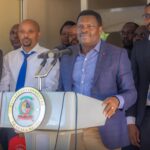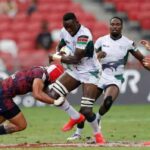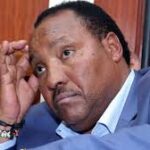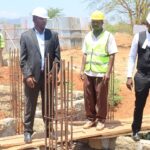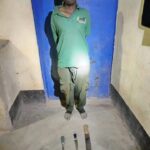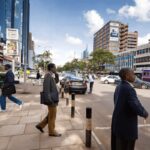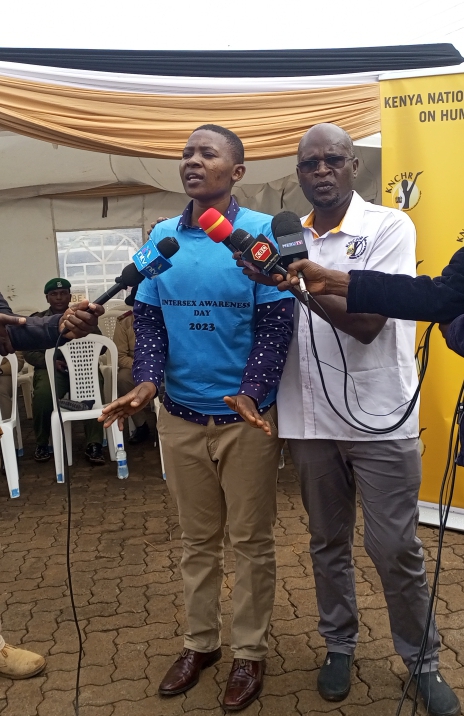
Gloriah Luhanga, an Intersex person addressing journalists in Meru town.
Various stakeholders from the human rights groups gathered in Meru County yesterday to commemorate this year’s international intersex awareness day.
The human rights crusaders as well as local administrators braved the chilly weather to walk along the streets of Meru town with an aim of sensitising the residents about the rights of intersex people who for long have been treated as outcasts by various communities.
The processions ended up at Tuskys grounds in Meru town where various speakers including intersex people drummed up for their protection and acceptance in the society.
According to Laban Cheruiyot from the Kenya National Commission of Human Rights (KNCHR), the country has a total of 1,524 intersex persons with Meru County having 41 of them, going by the 2019 census.
He however said the number of intersex persons might be higher than the above considering that not many of them wanted to identify themselves following stigmatisation from various quarters.
“During the 2019 housing and population census by the Kenya National Bureau of Statistics (KNBS), the government of Kenya approved the introduction of the third sex marker known as intersex persons. This is as a result of birth and not by choice and it is for this reason that their rights should be protected,” said Mr Cheruiyot.
He added that the rights of intersex persons in the country should always be protected just like it is done to other people who are either male or female.
“Intersex people must be recognised in all aspects even when they are being offered government services like civil registration,” said Mr Cheruiyot.
Gloria Luhanga, an intersex person and who works with KNCHR said she faced various challenges as she was growing up, just as her peers do.
“For instance, during registration and documentation, one might be wrongly registered but when they grow up, manifestation of the dominant sex comes out and it turns out that the person is of the other sex rather than the one registered. This becomes a great challenge and a point of stigmatisation,” said Luhanga.
She said other challenges include cultural beliefs where some communities view intersex children as a curse, failure to be recognised by the schools’ systems, discrimination in sporting activities as well as in some churches, and poor healthcare services where some doctors do not have knowledge about these persons and end up performing surgeries on them.
Mr Eric Mukoya from the Intersex Implementation and Coordination Committee said they were happy that a draft bill was already in parliament which is expected to ensure the rights of intersex persons are protected.
He warned medical practitioners against performing any surgeries to intersex babies which should only be done when they reach the age of consent.
“The dominant sex of intersex persons is dominant when they grow up and therefore doctors should not perform surgeries to remove any sex organ from a baby,” said Mr Mukoya.
Imenti North Deputy County Commissioner Ms Oddiliah Ndeti said will soon start laying strategies of recognising and protecting the rights of intersex persons including having special cells for them at the police stations.
“We have fully been sensitised about the intersex persons and we will start now to be their ambassadors in all the aspects possible,” said Ms Ndeti.


